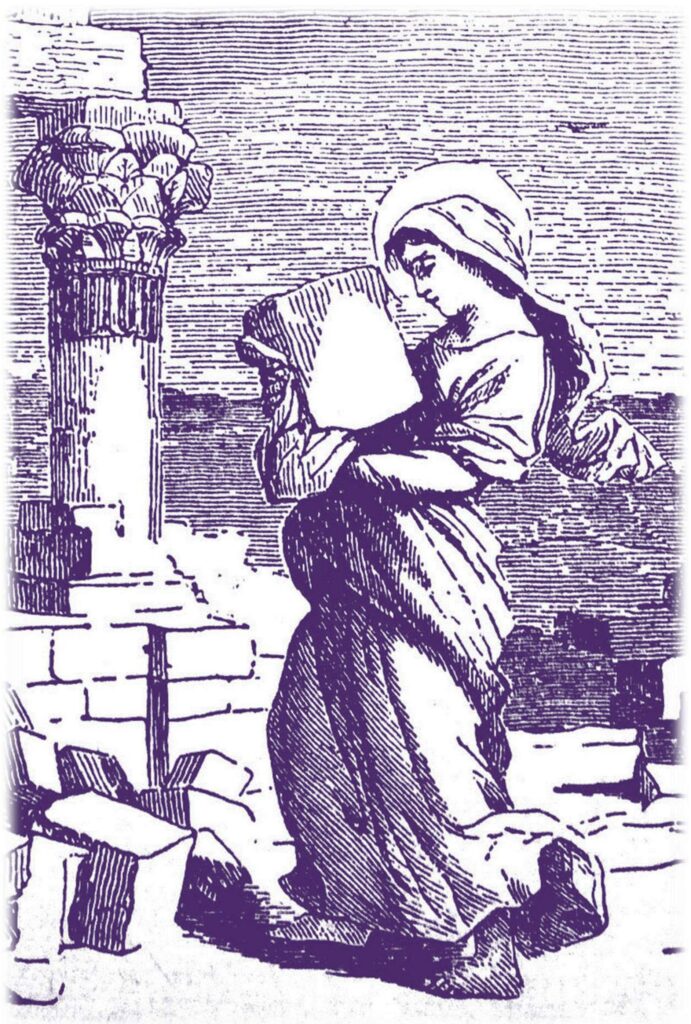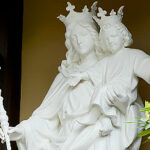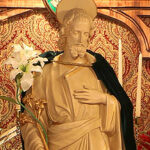
St. Euphrasia
Virgin Feast Day
March 13th
Thou have loved justice and hated iniquity: therefore God, thy God, hath anointed thee with the oil of gladness above thy follows. My heart had uttered a good word: I speak my works to the King.
Euphrasia’s father, Antigonus, was a kinsman of the Emperor Theodosius I, and her mother, also named Euphrasia, was of an equally exalted station. Both parents were as virtuous as they were socially privileged and wealthy. When Antigonus died a year after Euphrasia’s birth, the emperor took the widow and child under his protection. At five years of age, Euphrasia was promised in marriage by Emperor Theodosius to the son of a wealthy senator. When the young widow herself began to be sought in marriage, she took her child and moved to Egypt to live near a monastery of nuns known for their holiness and austerity. At age seven, feeling drawn to religious life, the little girl begged to be allowed to join the religious. Delighted, the mother cautiously allowed her a time in the monastery, but realizing that her daughter, despite her youth, was in dead earnest, the widow entrusted her child to the motherly care of the abbess. Soon after, feeling herself close to death, Euphrasia counseled her daughter: “Fear God, honour your sisters, and serve them with humility. Never think of what you have been, nor say to yourself that you are of royal extraction. Be humble and poor on earth, that you may be rich in heaven.” And, in fact, young Euphrasia edified her sisters by her astounding meekness and humility. Once, being tempted by all the things and honours she had left, her superior had her move a great pile of stones, at which task she persevered for thirty days, conquering her temptation. Upon the death of her mother, and Euphrasia having reached a marriageable age, the emperor pressed his claim requesting her return to court. But she sent him the following reply written in her own hand: “Invincible emperor, having consecrated myself to Christ in perpetual chastity, I cannot be false to my engagement, and marry a mortal man, who will shortly be the food of worms. For the sake of my parents, be pleased to distribute their estates among the poor, the orphans, and the church. Set all my slaves at liberty, and discharge my vassals and servants, giving them whatever is their due. Order my father’s stewards to acquit my farmers of all they owe since his death that I may serve God without let or hindrance, and may stand before him without the solicitude of temporal affairs. Pray for me, you and your empress, that I may be made worthy to serve Christ.” The emperor shed many tears upon reading Euphrasia’s reply, as did those senators who were present. Overcome, one of them exclaimed in admiration: “She is the worthy daughter of Antigonus and Euphrasia, of your royal blood, and the holy off-spring of a virtuous stock.” Shortly before his own death in 395, the emperor fulfilled all as she had desired. Euphrasia died at age thirty and was favoured with the gift of miracles before her death.
Prayer
Hear us, O God, our Saviour: that as we rejoice in the feast of blessed Euphrasia, Thy Virgin: so we may be taught by its devotion towards Thee. Through Jesus Christ, Thy Son who lives and reigns with Thee in they unity of the Holy Ghost God world without end. Amen.
R. St. Euphrasia pray for us.
V. That we may be made worthy of the Promises of Christ.
Reflection
Let us always remember our obligation to renounce ourselves and resist the desires of the flesh, fearing its constant seeking of self-satisfaction. In that way we will become docile rather to the Holy Spirit, and what the Apostle says will be realized: The one who adheres to God becomes one spirit with Him. (1 Cor. 6:17) Jean-Jacques Olier.
This year, it is more crucial than ever that we turn to prayer and intercession to increase devotion to Our Lady across our country. That’s why you’re invited to join us in the Three Hail Marys Pledge, a powerful devotion that can bring personal spiritual benefits and national transformation. By reciting three Hail Marys daily, you honour the Immaculate Heart of Mary and seek her intercession for the conversion of sinners, the salvation of souls and the restoration of Ireland’s Catholic Faith. This ancient devotion, revealed to Saint Mechtilde, promises spiritual benefits including protection from mortal sin and the assurance of a good death. Your daily prayers will contribute to an increase in devotion to Our Lady, the conversion of sinners and the moral renewal of our country. Let us commit to this powerful devotion and seek the guidance and protection of Our Lady.





